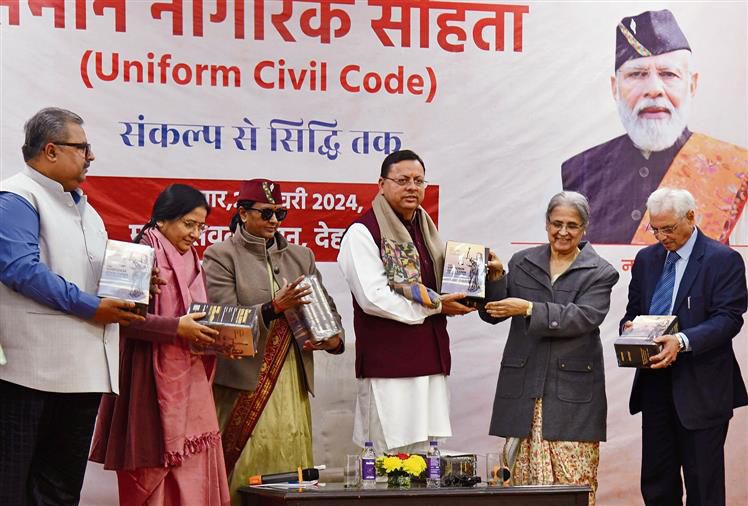UCC committee suggests legalising live-in relationships, equal rights in inheritance for both males and females; prescribing minimum age of marriage for women at 21 years among others
On February 6, the Uttarakhand government introduced the Uniform Civil Code bill in the State Assembly, which, if passed, will be the first such legislation implemented in any state since independence.
The bill proposes a common law on marriage, divorce, land, property, and inheritance for all citizens in Uttarakhand, regardless of religion, with the exception of the Scheduled Tribes.
The bill requires the registration of live-in relationships in the state, as well as a three-month prison sentence if they are not registered within one month. Any child born from such a relationship is considered legitimate.
Chief Minister Pushkar Singh Dhami tabled the Uniform Civil Code (UCC) of Uttarakhand, 2024 bill in the House, and in a symbolic gesture, he entered the Assembly holding a copy of the original Constitution.
Treasury benches greeted the bill’s introduction with thumping desks and chants of “Bharat Mata Ki Jai,” “Vande Mataram,” and “Jai Shri Ram.”
The original order of business for the day stated that the bill would be tabled, debated, and passed by the House, but Speaker Ritu Khanduri amended it to accommodate opposition members’ requests for more time to study the bill and present their views. Before the bill was tabled, opposition members protested inside the House, claiming they were not given enough time to study its provisions.
“It appears that the government intends to pass the bill without a debate, which violates legislative traditions,” said Opposition Leader Yashpal Arya.
The opposition members also raised slogans, but the Speaker reassured them that they would have enough time to study the bill.
They also protested the House Business Advisory Committee’s decision to suspend Question Hour to table the UCC.
They argued that the Question Hour was necessary to raise public-interest issues such as disasters, such as land subsidence in Joshimath, and justice for Ankita Bhandari, a receptionist at a resort in Pauri district who was allegedly murdered by her employer.
Live-in relationships to be registered under the Uniform Civil Code Bill:

UCC panel head and retired Supreme Court judge Ranjana Prakash Desai and other panel members submit their report to Chief Minister Pushkar Singh Dhami | Picture credits: PTI
The bill applies to all of Uttarakhand, as well as residents of the state who live outside of its borders.
However, the bill excludes the Scheduled Tribes.
“Nothing contained in this code shall apply to the members of any Scheduled Tribes…. and the persons and group of persons whose customary rights are protected under the Part XXI of the Constitution of India,” the text of the bill reads.
It will take effect from the date it is published in the gazette.
Also Read: How to Protect Juvenile Rights in India
The bill requires partners in a live-in relationship within the state, whether or not they are Uttarakhand residents, to submit a statement of their relationship in a prescribed format to the Registrar within whose jurisdiction they are living. It also states that any child born from a live-in relationship must be considered the couple’s legitimate children.
Live-in relationships involving a minor will not be registered. Live-in relationships in which one of the partners’ consent was obtained through force, coercion, undue influence, misrepresentation, or fraud regarding the identity of the other partner will also not be registered.
The bill states that anyone who stays in a live-in relationship for more than a month without registration will face imprisonment for up to three months, a fine of up to ₹10,000, or both.
Anyone who provides false information in his or her statement to the Registrar about a live-in relationship may face a higher fine as well as imprisonment for up to three months.
If a woman in a live-in relationship is deserted by her partner, she is entitled to maintenance from him, which she can seek in a competent court with jurisdiction over the location where they last cohabited.
Once it becomes an act, Uttarakhand will be the first state in the country to adopt the UCC after Independence. It has been in use in Goa since the days of Portuguese rule.
The ongoing session of the State Assembly was convened specifically to pass the UCC bill.
Passing legislation on the UCC will fulfill a major promise made by the BJP to the people of the state in the lead-up to the 2022 Assembly elections, in which the saffron party won a landslide victory for the second consecutive term.
Several BJP-ruled states in the country, including Gujarat and Assam, have expressed a desire to follow the Uttarakhand UCC as an example.